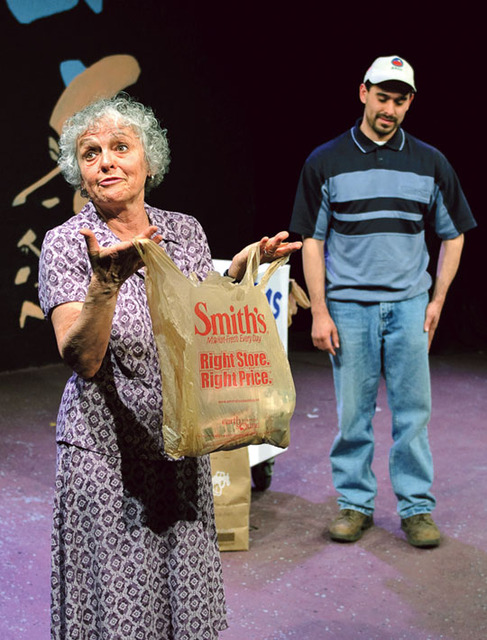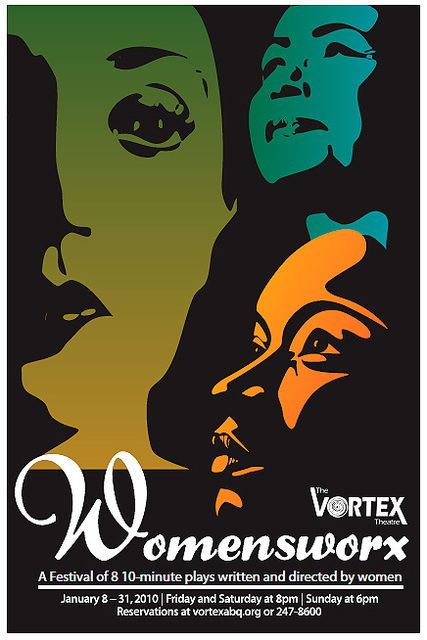Last year The Vortex Theatre put out a nationwide call for short plays for a brand-new festival called Womensworx , which would feature only pieces both written and directed by women. It received 186 submissions and culled eight winners from the pile, with playwrights from seven states (Virginia, California, Massachusetts, Indiana, Arizona, Utah and New Mexico). At the end of the festival’s four-week run, two plays will receive honorariums, one for being an audience favorite (you get to vote) and another for winning the hearts of a panel of judges.There’s one thing you should know before seeing Womensworx : The 8- to 10-minute plays that make up this festival aren’t fully realized productions with professional actors, costume design and expensive sets. Rather, they’re more like a collection of staged readings. Set your expectations appropriately, because it will make a difference in your enjoyment of the works.The event’s tone is largely amateurish, from the festival’s name (it’s the “x” that does it) to the sparse stage production. Lighting, for instance, is schizophrenic. Turned up uncomfortably high at the outset of each play, the lights dim dramatically and suddenly about halfway through the pieces—almost as though the actors are on a game show instead of in a theater, with the lights used as a way to signal when their time is almost up. It’s unimaginable that this might be intentional, as it insinuates plays are ending when they aren’t, thereby obliterating any pacing and suspense.The actors come across as dilettantes—with a few exceptions—and most of them probably are. The effect of this is clear. Several of the scripts are solid—imaginative, surprising and well-written—but it’s hard for their merits to come across when the actors seem so inexperienced. It would be interesting to see all the works again in the hands of professionals.Still, there are a few highlights. “Music. Poem. Music,” written by Elaine Jarvik and directed by Susan Erickson, opens the festival. It’s a tale about two diametrically opposed sisters who come together in a diner to perform their father’s last wishes over pie and a cigar box. The script makes a statement about expectations—the ones we carry for ourselves and for our parents—as well as the indelible emptiness and confusion that comes with the loss of family, whether through estrangement or death. It’s one of the few funny plays in the lineup, and the actors Jen Stephenson and Tara Brinduse deliver it smartly, combining great comic timing with sadness and sweetness.“Paleta Man,” written by Alex Finlayson and directed by Claudia Mathes, is also well-executed. The story revolves around a woman who has just lost her husband to a heart attack and the paleta vendor who knew him. The performances of Eric Ramos and Ninette S. Mordaunt are earnest and believable, and the story is a delicate snapshot of two lives briefly intertwining. Other plays have some elements working in their favor. “Oracle,” by New Mexico’s Kate Horsley, is clever and performed nicely by Stephanie Nicole Grilo and Kristin Cooper (with harp-playing by Victoria Amada). And the acting from Stephanie Anne Landers (“Seldom Is Heard”), Alexa Bauer and Thane Kenny (“Hip Replacement”) is enjoyable. (Full disclosure: Kenny is the Alibi ’s circulation director.)But some of the plays have insurmountable difficulties. ‘Forget Me Not,” about a teenage girl who works at a flower shop and talks only in text-speak (i.e., “BRB, dudes, LOL”) and two older women who are coming to terms with age, is difficult to get through for about as many reasons as you can imagine. Also, “Colors Left Unsaid,” which focuses on a pair of ex-lovers arguing about their past at a gallery opening, comes across as self-indulgent and strenuous (although actor Michael L. Miller does good work in it). And in “Dance Lessons for Catherine,” which follows a clichéd storyline about a housewife liberated by an affair, the entire play is performed while waltzing. Literally. The actors are dancing the whole time. Even during two uncomfortable, gyrating “sex” scenes.One of the truly strange things about this collection of plays—written by women, directed by women, all coming together under the header Womensworx —is that all of the pieces are centered in some way around women’s relationships to men. A dead father, a dead husband, an inattentive husband, a woman who doesn’t know what to do with her life now that she’s lost her husband and son, a husband changed by war, an ex-husband who wants to get his band back together, a girl who tried to kill herself because a boy didn’t like her. It’s odd. The notion of having a festival exclusively for female playwrights feels limiting, almost insulting. Women can compete on an even playing field with men, so why separate them? The Vortex, or any other theater company, would probably generate some strange looks if it put on a similar festival exclusively written and directed by men. It’s preferable to see work judged solely on quality. But if you’re going to have a woman-centric festival, there’s a weird message in having nearly all of the female characters’ lives be defined in one way or another by men. Just sayin’.The Vortex produces some fabulous theater in this city, and the venue’s spring lineup looks promising ( Bless Me, Ultima included). It’s not that you shouldn’t see Womensworx . Just know what to expect.
Womensworx
runs through Sunday, Jan. 31.
Fridays and Saturdays at 8 p.m., Sundays at 6 p.m.
The Vortex Theatre
2004 1/2 Central SE
$15, $10 student rush
247-8600 •
vortexabq.org.











